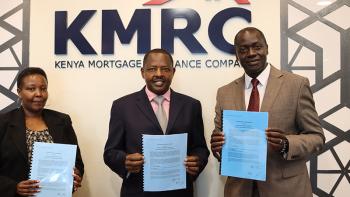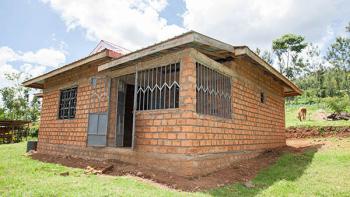Country Facts:
- Capital city – Nairobi
- Population – 54 million
- Life expectancy – 61 years
- Unemployment rate – 5.5%
- Below poverty line – 29.4%
* International poverty line of US$2.15 (World Bank)
Find more country facts on: CIA The World Factbook – KENYA
Habitat Facts
• Habitat started in Kenya in 1982.
• Individuals served in FY2024 : 353,620
o Through new construction: 123
o Through incremental construction: 1393
o Through market development:
• Total number of Households served: 43,015
• Total capital mobilized: $283,341.08
• Volunteers engaged in FY2024: 319
The housing need in Kenya
The growth of Kenya’s population, currently at about 55 million, has contributed to the country’s inadequate supply of new housing units. The annual housing demand is 250,000 units, but only an estimated 50,000 units are supplied. The proportion of the total population living below the international poverty line is 29.4%, with an unemployment rate of 5.5%, according to the World Bank. Housing affordability is a major challenge in Kenya, and many people cannot afford to buy or build their own home.
About 6.4 million people from Kenya’s urban population live in informal settlements, while an estimated 60% of the capital city Nairobi’s residents live in slums. In rural areas, the problem is characterized by poor quality housing and a lack of basic services, such as clean drinking water. In addition, 68% of Kenyans lack land documentation or tenure security. The Kenyan government has made adequate and affordable housing one of its priorities to bridge the housing deficit. However, the delivery of housing is the responsibility of county governments, which often lack adequate resources.
How Habitat addresses the need
Housing for orphans and vulnerable groups
Habitat Kenya supports marginalized and vulnerable groups such as orphans, widows, older people and people with disabilities who live on less than US$2 a day and need adequate access to housing and water and sanitation facilities We work with corporate partners and volunteers to help build affordable homes and promote home ownership for these vulnerable groups.
Community infrastructure
Through a settlement-based approach, Habitat Kenya aims to build safe and resilient communities where families can afford quality homes with access to basic services and infrastructure. Our activities include house construction, water facility construction and rehabilitation, improved community sanitation infrastructure and systems, energy solutions, and livelihood support. In disaster prone areas, Habitat Kenya also supports communities to reduce risks and improve their ability to respond to emergencies.
Advocacy for security of tenure
Through our advocacy program, we empower women and other vulnerable groups to secure land tenure through formal and informal mechanisms of land ownership. We also support county government policymakers to promote policies, laws, systems and practices that ensure access to adequate and affordable housing and improved living standards.
Financing for owner-led home construction
We empower low-income households to access appropriate, affordable financial services for adequate housing. This involves forming and training groups of women and youth and other community groups on
financial literacy and consumer education. We also build the capacity of financial institutions such as savings and credit organizations and microfinance institutions in developing products and processes to
serve low-income households.
Building and expanding inclusive housing markets
Habitat’s Terwilliger Center for Innovation in Shelter has supported more than 10.4 million individuals in Kenya in fiscal year 2023. The Terwilliger Center is launching the Integrated Housing Support Project which aims to build strong communities and an accessible housing market in Laikipia County. Through the project, Kenyan communities will have access to improved education, increased employment opportunities and safe and sustainable housing.
What you can do
DONATE
Please visit habitat.org/donate and select “Designate your donation” to donate to Habitat Kenya.
VOLUNTEER
The Global Village program is resuming in select locations in Africa, Kenya being one of them until a safe and quality experience can be provided at scale worldwide. Please visit habitat.org/gv for more information and updates.
TITHE
Habitat affiliates in the U.S. support the international work through an annual tithe. For additional information, email [email protected] or contact your local Habitat organization.
CONTACT
Rita Munyae
Partnerships Manager
Eileen Mokaya
National Director
Habitat for Humanity Kenya
CVS Plaza 3rd Floor, Kasuku lane off Lenana Road, P.O. Box 38948 00623 Nairobi, Kenya
Tel.: +254 717 454 380, +254 20 257 2812
Website: www.hfhkenya.org


